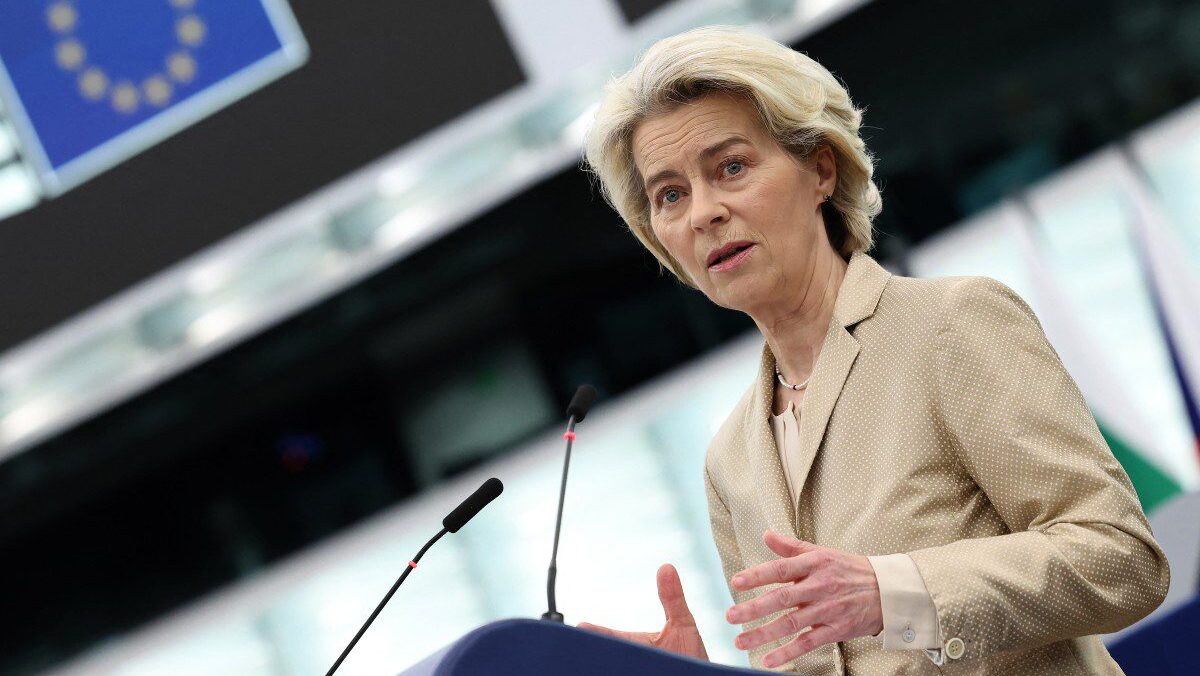
Commission President Ursula von der Leyen
Photo by FREDERICK FLORIN / AFP
European Commission President Ursula von der Leyen has surprised everyone by pouring cold water onto Kyiv’s fast-tracked EU accession expectations. Talking to reporters on Wednesday, February 21st, the head of the EU executive said she did not expect the Commission to finalize the negotiation framework before the European elections in early June.
Until now, imminent publication of the document—detailing a set of specific guidelines, milestones, and basic principles—was taken for granted, so that after the 27 member states approved the paper, Kyiv and Brussels could begin accession talks in earnest.
The claim that delaying Ukrainian EU membership would intentionally strengthen Putin’s Russia appears to have been quietly forgotten.
After all, the main conflict during December’s European Council summit was about whether the EU could get all its member states to agree to start membership negotiations with Ukraine. Any minute delay caused by one reluctant member state—Hungary—was portrayed as a direct attack on Ukraine and the EU as a whole.
However, now it seems the same sense of urgency doesn’t apply to the Commission chief. “We are still working on the negotiation framework,” von der Leyen announced, explaining:
My best guess is that it will not be ready before the European election but afterwards because I see the development of the different negotiation positions [and] this will take its time—but I guess around summer, beginning of summer we’re going to be ready.
According to Politico, the comments sent a shockwave through the diplomatic circles in Brussels. Ukraine’s staunchest supporters wanted to begin talks as soon as possible and especially wished to avoid having to deal with the issue during Hungary’s term at the helm of the EU, when Budapest assumes the Council’s rotating presidency in July, right after the elections.
Kyiv was also quick to voice its outrage, urging the Commission to reconsider and stick to the promised schedule instead. “I do not see the reasons why it would be difficult,” Ukraine’s EU ambassador Vsevolod Chentsov commented, adding that if the Commission is facing any problems, Kyiv was “ready to discuss and see how to overcome those.”
However, it’s increasingly clear that the delay is not because of administrative problems, but is simply another sign of von der Leyen switching to campaign mode. Earlier this week, the Commission chief officially announced her reelection bid and immediately began to soften her stance on some of the more controversial issues, including scaling back the Green Deal roll-out.
Slowing down on Ukraine might also be her way of gaining support from member states and parties who would rather play it more cautiously, especially in the light of the recent—and in some countries, ongoing—farmer protests, as agriculture would be among the first and hardest-hit sectors to bear the financial burden of Ukraine’s EU membership. Just days ago, Polish farmers completely blockaded all border crossing points to Ukraine to protest against cheap imports—an unprecedented show of strength that not even Brussels can ignore now, it seems.
According to a new study published by the Estonian think tank International Center for Defense and Security (ICDS), Ukraine’s EU membership would cost the rest of the bloc at least €19 billion a year, significantly increasing member state contributions. This will particularly affect Western Europe, as Germany—already the largest contributor—will be expected to pay 20% more. But the most affected would be the agricultural subsidies, as the ICDS calculated that around half of all the available EU grants meant for the European agri sector would end up in Ukraine.
There is much to consider before the Commission can send out its final negotiation guidelines to the member states. If the document doesn’t address every major concern that might arise in the 27 capitals, it risks being rejected and sent back to the drawing board in Brussels. This would mean further delays for Ukraine while also embarrassing von der Leyen. The president would rather avoid such situations if possible, at least until she knows the future composition of the Parliament that she has to win over to secure a second term. Yesterday’s priorities will get treated as pending, perhaps indefinitely, if it suits her ambitions.
All this means, in essence, that Ukraine’s fast-tracked EU accession was perhaps more about political theater than the urgent “strategic decision” von der Leyen often lobbied for and that Viktor Orbán’s concerns about rushing into a situation without considering its full implications wasn’t as unfounded as everyone claimed. Once again there is one rule for Hungary, another for Brussels. Despite the endless talks about ‘values,’ the EU is ultimately about politics, and political principles tend to become increasingly flexible as elections approach.
